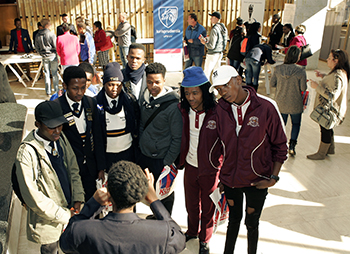
The University of the Free State Bloemfontein
Campus opened its doors to prospective 2018
students at this year’s Open Day to learn what
being a Kovsie entails.
Photo: Johan Roux
Photo Gallery
Video
“It is important for us not to be stressed or confused, as you need to understand where your passion lies.”
These were the encouraging words of Prof Francis Petersen, Vice-Chancellor and Rector of the University of the Free State (UFS), to the learners in the Callie Human Centre on the Bloemfontein Campus during this year’s Open Day on 13 May 2017.
Prospective learners, teachers, as well as parents came out in numbers to learn and see what the UFS has to offer. The audience was also set ‘In the Mood’ by the enchanting voices of the Swing-City band.
UFS represent diversity, inclusivity as well as academic excellence
Prof Petersen highlighted the importance of the values which the UFS stands for, namely diversity, inclusivity, and academic excellence, as vital reasons why learners should consider coming to the UFS.
“We believe that innovation is part of the curriculum, it is part of the way we do things, and it is also embedded as a key attribute that we will expose potential Kovsie students to,” he said.
Mpho Maloka, a parent from Welkom, says: “It (the UFS) represents the Free State and it is home-brewed. We want our kids to have the best education, and with many of my colleagues that graduated from the UFS, you can see the quality, the enthusiasm, and the success that comes from this university.”
Graduates to impact society through innovation
Prof Petersen said that the UFS will not only develop them as individuals, but will also assist them in making a contribution to society. “If you really want to have an excellent degree, well-rounded exposure to Kovsie life, make an impact on society through innovative thought, and also have the value of being exposed to a richness of diversity, then Kovsies is the place to be.”
Sergio Abdiziet, a learner from Heidedal, said that he’d like to be part of the UFS, because it is one of the best universities in the country.